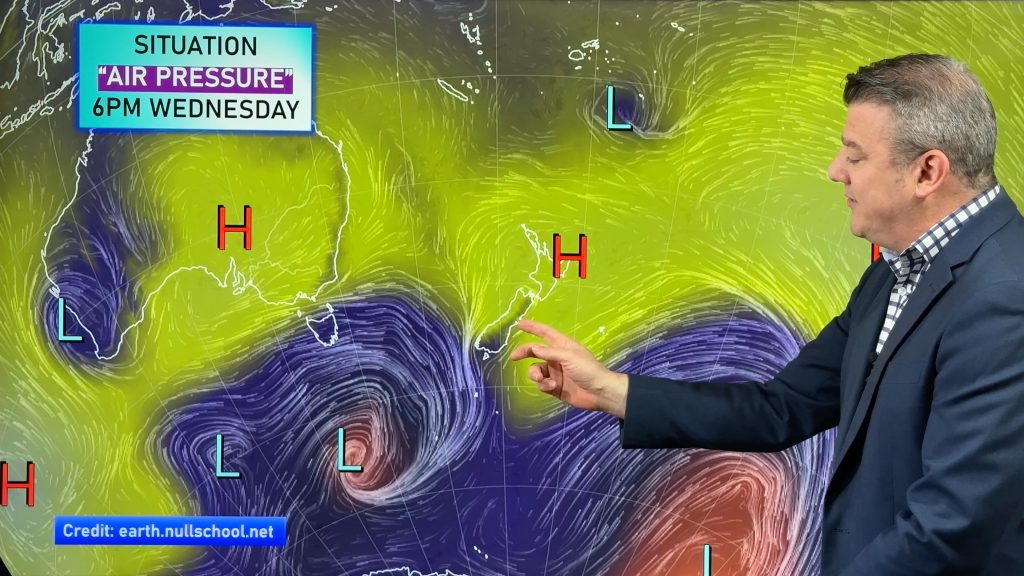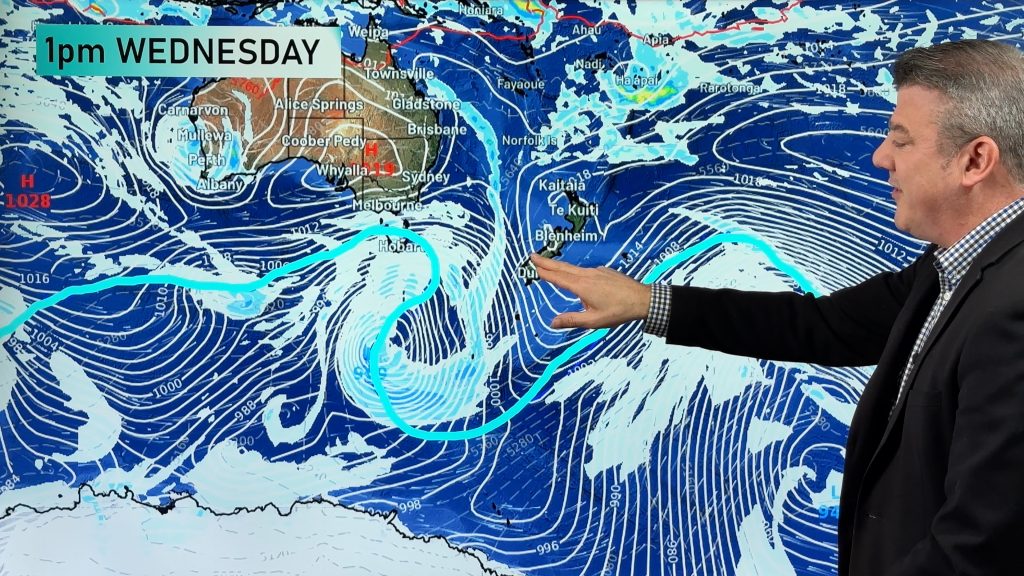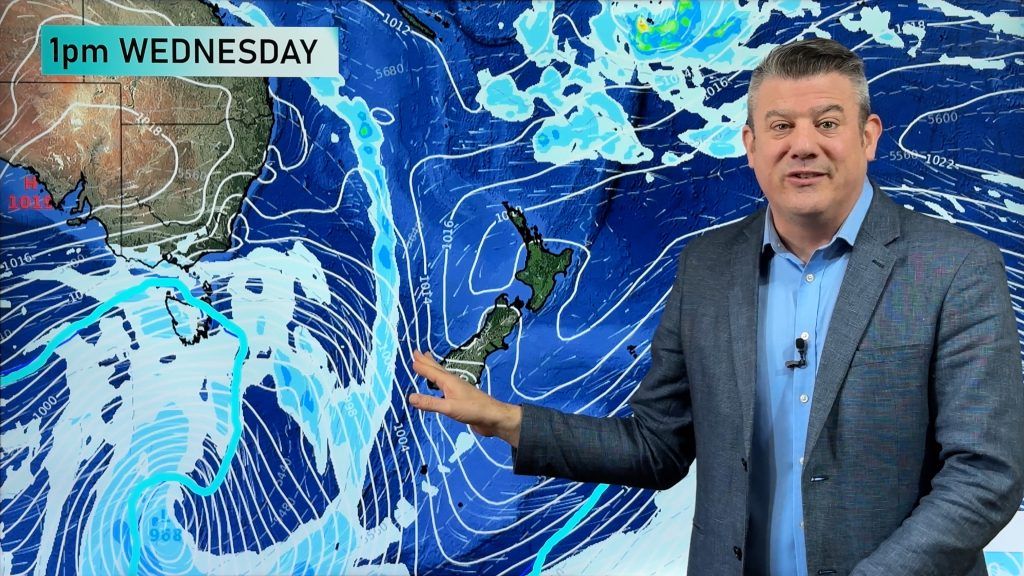
> From the WeatherWatch archives
Most Commented on Story — On Friday nzherald.co.nz contributor John Drinnan wrote a column about weather news coverage in New Zealand – in particular pointing out the TV news coverage of weather events. That afternoon I was interviewed, as I am every Friday afternoon, by Newstalk ZB host Danny Watson – and he asked me if weather news coverage in this country is all hype.
I replied by mentioning a Bill O’Reilly interview I’d seen on Fox News the day before, in which O’Reilly spoke about the recent passing of 60 Minutes legend Mike Wallace. In the interview they discussed that within the media industry there is a ‘dirty secret’ that people don’t like to admit – your news comes wrapped up with a bit of show biz.
The complaints that frequently appear on news websites, including ours, often mention the ‘sensationalism’ in news coverage.
However just plain news, with no opinion, no energy and no passion, is dull. Sure, not everyone will agree with me, but there’s a reason why private media organisations all over the world often rate so well – they bring energy to the news.
My father, who is a recently retired primary school principal, frequently had this debate with me when I first got into the media industry in the mid 90s. He said he wanted his news straight up with no opinion, no bells and whistles. “The news should be just the news” he said. While I agree that facts should never be distorted or omitted to slant a story in a different way, I have no objection with a bit of energy and passion though. Opinion is absolutely fine too, so long as it is clear that it is opinion.
Here at WeatherWatch.co.nz we try to make it clear between a news story – which quotes our forecasters – and an opinion piece like this. The headline gives it away for starters.
To sensationalise a story means the person writing it is using sensational language – to arouse an intense emotional response or to make something seem far more shocking than it really is.
But often when we’re accused of sensationalising the weather it’s because we’re using strong language to warn of dangers….and folks, the dangers ARE shocking. Extreme weather can very easily equal death. Are the ads on cigarette packs sensationalism? Or factual?
The term “weather bomb” is a technical term from the word “bombogenesis”. It is, in fact, a rare but severe weather occurrence which seems to happen every few years around New Zealand. Bob McDavitt used it last decade and it’s caught on – it’s different. It’s a bloody great term to describe these severe weather events. Where the term has gone wrong is when journalists and on-air personalities use it to describe every weather event under the sun.
Next time you hear the term used please check our website – if it’s not on our site, chances are there isn’t a weather bomb and the original source was incorrect. But don’t blame us for them using it – we’ll only ever use it when one is about to form.
The term is apt because these storms literally explode out of thin air. The one we had last month wasn’t even showing up 12 hours before it slammed into Wanganui and Patea. Did you see the damage on TV? Walls blown out of buildings in the main street. Roofs peeled off. Trees down. This was in Patea, a town so small most New Zealanders have never heard of it. Can you imagine if this had happened in downtown Auckland? Injury or even death could have occurred.
But in New Zealand the shape of the country and the small size of our two islands means weather forecasters are forever up a certain creek without a paddle.
Major storms brush past us with ease – churning up the seas while leaving sunny weather on land.
Look at the top of NZ – its thin and pointy. A low coming down from the tropics is a bit like trying to balance an egg on a roof – it’s most likely going to run down one side or the other, and less likely to come down the middle over land.
But we absolutely must warn of these systems.
I recall when I first set up WeatherWatch.co.nz I sent a press release to the news media urgently warning of “potentially deadly thunderstorms” moving into Northland. Since that day I have never used the term again – not because I was wrong, but because it was simply a freak storm that I had never seen before and haven’t seen since. An editor at one of the news rooms in Auckland called me and told me it was “over the top”. I told the editor I chose my words carefully – this is a very dangerous thunderstorm band – something like 2000 strikes an hour in a very small cluster.
The term was never used and an hour later a man was struck and killed by lightning. I’m not saying our warning would’ve saved his life…but what if it had? I didn’t chose that term to win ratings – I chose it because I was concerned with the situation.
If any of you have ever run a website, or any business for that matter, you’ll know that burning your customers will eventually burn you. I am acutely aware of this everyday – and you, the reader, are our customers.
In New Zealand there is this strange mentality that if there isn’t damage, then the forecasters are wrong. If a storm misses Bay of Plenty, it may just shoot off out to sea and not harm a soul. It’s so frustrating at times – and for those who think we’re in this for fun, I can assure you we have all lost countless hours of sleep as we worry about accuracy and hoping that our predictions contained the right balance – wanting to educate you as best we can about what is coming in but hoping we have the ingredients right so that we haven’t over done it.
If I could turn back the clock on our stories about the tropical low 10 days ago I would never have mentioned the word “cyclone” in the story – simply “tropical low”. But I absolutely stand by everything else we said – as we constantly repeated our levels of confidence. Remember – we have no editorial control over how other media outlets use our stories, but when they get it wrong we do inform them. The quality of reporting of weather has absolutely improved over the past few years. I remember a time when rain warnings for Fiordland were front page material on quiet news days. But our gentle…nagging…if you like, has seen those stories drop down and the more important ones lift up.
We have seen what storms can do – Bola, Wilma, Fergus, Drena, the Wahine storm etc.
When we warn of systems we try to give you confidence levels too. The stormy weather predicted last week – which ended up only affecting Gisborne and East Cape – only affected those two areas because it mostly tracked just to the east of the country. WeatherWatch.co.nz received more positive feedback than negative – while we were wrong (as were the other guys) many were happy they had sunny weather instead of stormy. We said from day one that our confidence was only low to moderate. That rough weather was literally just a couple hundred kilometres offshore. On top of that, we apologised for getting our forecast wrong (the only ones to do so). We did this because we believe in being as open and as honest as possible.
At the end of the day though, we can only do our best – and no forecaster in the planet is 100% accurate. But for God’s sake, please stop blaming the forecasters. We do get it wrong from time to time, but remember this – we don’t make the weather – we just predict it as best as we can. It’s up to the public to decide who they think is more accurate and the most honest.
So yes – we make videos that have energy in them. We write news stories, sometimes with humour. We have a website that is colourful and not dull. When we have day after day after day of the same stuff we show-biz it up a bit with fun stories and talking about storms outside of New Zealand. But when it matters we stick to the facts – and our opinions we try to make as clear as possible along with our confidence levels. And if you don’t like how we present the weather, you don’t have to listen to us. There are plenty of other options out there.
But remember, we have some pretty high profile clients who also ensure we aren’t all bluster. Auckland Civil Defence being one of them. We are constantly seeking their advice on how we handle particular weather events and where we can improve next time. Public safety is paramount to us…so is our reputation.
I want to leave you with this last thought – do not make the mistake of confusing frequent updates as being sensationalism. We don’t try to shock people. But we do warn of the risks as much as possible for one reason – to save lives. If we’ve saved lives by accurately and frequently warning people how would you know? Chances are you wouldn’t . But we’d be hung out to dry if lives were lost and we said nothing because we were scared of offending a minority who simply don’t like who we are because we don’t have letters after our names.
We are doing what we do to keep people safe. End of story.
– By head weather analyst Philip Duncan
Comments
Before you add a new comment, take note this story was published on 14 Apr 2012.





Add new comment
Anne on 15/04/2012 10:16pm
Well put Phil. You guys do a great job informing us about the weather and I like the news format plus links to the weather in Australia and threats in the Pacific.
Reply
Anna on 14/04/2012 9:01am
Well said Phil. I live in Townsville Australia and check into your page each day. We knew about the birth of cyclone Yasi from you before we had any advice here.There will always be the whingers but it is very easy to criticise from the arm chair or computer desk. Keep up the good work.
Reply
Guest on 14/04/2012 8:53am
Well written Phil. You guys do a great job and present the weather news in a not too sterile manner. I was in Thames during the 2002 weather bomb (the first time I ever heard the term) and it certainly was used correctly that time. Having lived through one weather bomb I certainly wouldn’t want the term bandied about needlessly to describe lesser events.
Reply
Glenn on 14/04/2012 5:57am
You guys were the first ones I checked when I heard about the earthquake off Aceh the other night.
And up to date news was there. You folk are doing well.
Reply
Zelda Wynn on 13/04/2012 11:06pm
Wow, an impressive explanation Phil !
I am very impressed with your ability to read the weather with astounding accuracy,ability and passion with very updated news snipets.
Try cloud watching (gosh the sky can be busy) to relieve built up stresses, a little bit like getting lost in heaven.
Reply
Kelly on 13/04/2012 11:01pm
Nice piece! I like the fact that your website is not afraid to stand up and admit they were wrong. It is so easy for the weather to change so rapidly in NZ.
I like what you said about the over-use of the word “weatherbomb”. I always worry that if broadcasters and journos call every event a weatherbomb, people will becoming desensitised to the severity of it and not take any notice of it on the one occasion they should.
Thanks for producing such a quality site!
Reply
Nic on 13/04/2012 10:23pm
I think since the tragedy (four years ago tomorrow I believe) that beset Elim, weather reporters have made more of a point of alerting the public to dangers of severe weather, and the public take those warnings more seriously. It would be a shame to regress for the sake of not wanting risk being a sensationalist.
Reply
Nic on 13/04/2012 10:19pm
You do a fantastic job, and at no charge to us. Nobody has to use your website and nobody has to believe it. You are more accurate than any other weather service and your passion for weather and for helping people to understand weather is second to none. I rave about your site to anyone who will listen!
Keep it up and don’t take the whiners personally!
Reply
Derek on 13/04/2012 10:14pm
Fantastic article Phil, great read as always & I agree with all the others here that you do a magnificent job.
You have completely changed the way weather news etc is done. It is now not only accurate & meaningful, but very interesting as well.
I visit your site several times a day for updates etc and due to your way of explaining things I have learnt an awful lot about weather.
I notice since your site came online the others have picked up their game.
Reply
Ian Pritchard on 13/04/2012 9:57pm
Bravo Phil! – a well written piece. Keep doing what you do so well.
Reply
View more comments